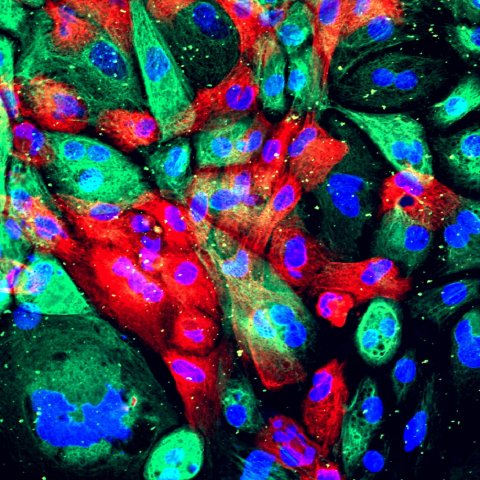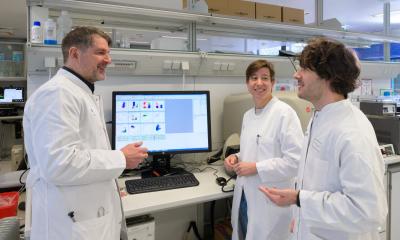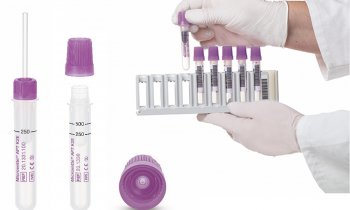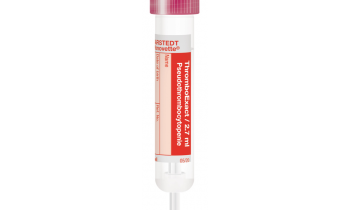Article • Cancer research
Prostate cancer: Blood tests predict chemotherapy resistance
Researchers have found that regular blood tests can help detect whether prostate cancer patients have resistance to drugs treating the condition.
Report: Mark Nicholls

Image source: National Institutes of Health
The findings were presented at the National Cancer Research Institute (NCRI) virtual Festival. The team from Barts Cancer Institute, Queen Mary University of London, discovered that the tests – performed before and during chemotherapy for prostate cancer – can detect at an early stage whether a patient is resistant, or developing resistance, to treatment with docetaxel. The chemotherapy agent is often used in patients with prostate cancer that has metastasised and does not respond to therapy to lower levels of the hormone androgen. This therapy can improve survival, but some patients are resistant, or acquire resistance, to docetaxel.
Caitlin Davies, a PhD research student at Barts Cancer Institute, and colleagues investigated the possibility of identifying docetaxel resistance and survival prediction from the number of circulating cancer cells (CTCs) that have detached from the tumour and entered the bloodstream They took blood samples from 56 patients with advanced prostate cancer who were being treated at St Bartholomew’s Hospital, London. Several samples were taken over a period of 6-8 months to reflect the different stages of therapy; before the start of docetaxel treatment, after the first dose of chemotherapy, before the fifth dose, and after all doses had been administered. ‘This meant that we could monitor changes in CTCs in response to treatment,’ said Ms Davies.

Photo: supplied
The researchers then looked for patterns in treatment response and rate of disease progression after treatment. ‘Using these patterns, we can apply them to future patients with the goal to predict whether they will respond to therapy and pre-emptively decide on the best course of action that will have maximal benefit,’ Ms Davies explained. ‘For instance, an increase in CTC numbers may indicate a lack of response to treatment. Furthermore, by monitoring the appearance of potentially drug-resistant CTCs, we can change treatment tactics early on and in a patient-personalised and timely manner.” Examples for alternative therapeutic options are abiraterone or cabazitaxel, which have been shown to prolong survival in docetaxel-resistant patients.
The researchers found that men who were less likely to respond to docetaxel had an increased risk of cancer recurrence or progress within three months. Furthermore, detection of more than six CTCs per 7.5mL of blood before the first docetaxel dose was shown to be an indicator of increased mortality within 18 months. This compared to progression-free survival of 17 months and an overall survival time of three years for men who tested below this threshold.
Detection of more than one “classic” type of CTC before docetaxel treatment or high numbers of CTCs towards the end of treatment were also associated with more rapid progression and higher mortality. ‘This insight into how CTC dynamics lead to reduced progression-free and survival times is vital for clinicians,’ continued Ms Davies. ‘It will enable them to make early changes of treatment from docetaxel to an alternative, which may significantly improve patients’ chances of long-term survival.’
The researchers also discovered that a protein encoded by a gene called KLK2 was significantly better at predicting time to disease progression and death than the current gold standard protein, prostate-specific antigen (PSA), which is encoded by the KLK3 gene.
Recommended article

Article • On the way to diagnostic mainstream
Liquid biopsy to advance cancer diagnosis
Liquid biopsy offers a new dimension to detection and stratification of cancer – yet the technique also faces hurdles in becoming a mainstream diagnostic approach for more personalised treatments. A critical challenge lies in identifying the extremely low concentrations of the bio-analytes of CTC (circulating tumour cells), ctDNA (circulating tumour DNA) and exosomes in the blood.
These results suggest liquid biopsies as a painless, minimally invasive, cost-effective and easily repeatable alternative to painful regular tissue biopsies, with results available in 2-3 days, rather than 10 days. Ms Davies concluded: ‘Although these results are highly promising, they require further validation in a larger group of patients, perhaps in a clinical trial.’ To this end, the study team is looking into further validation of CTCs as biomarkers for prostate cancer and investigating several genes in CTCs that may be involved in resistance to docetaxel to better understand the mechanisms and identify new targets for anti-cancer drugs.
Professor Hashim Ahmed, Chair of the NCRI Prostate Group and Professor of Urology at Imperial College London, who was not involved in the research, said: ‘These are promising results and have the potential to change clinical practice, if they are confirmed by further research.’
Profile:
Caitlin Davies is a PhD research student at Barts Cancer Institute, Queen Mary University of London in the UK. Her study was funded by the Medical Research Council.
23.11.2021











